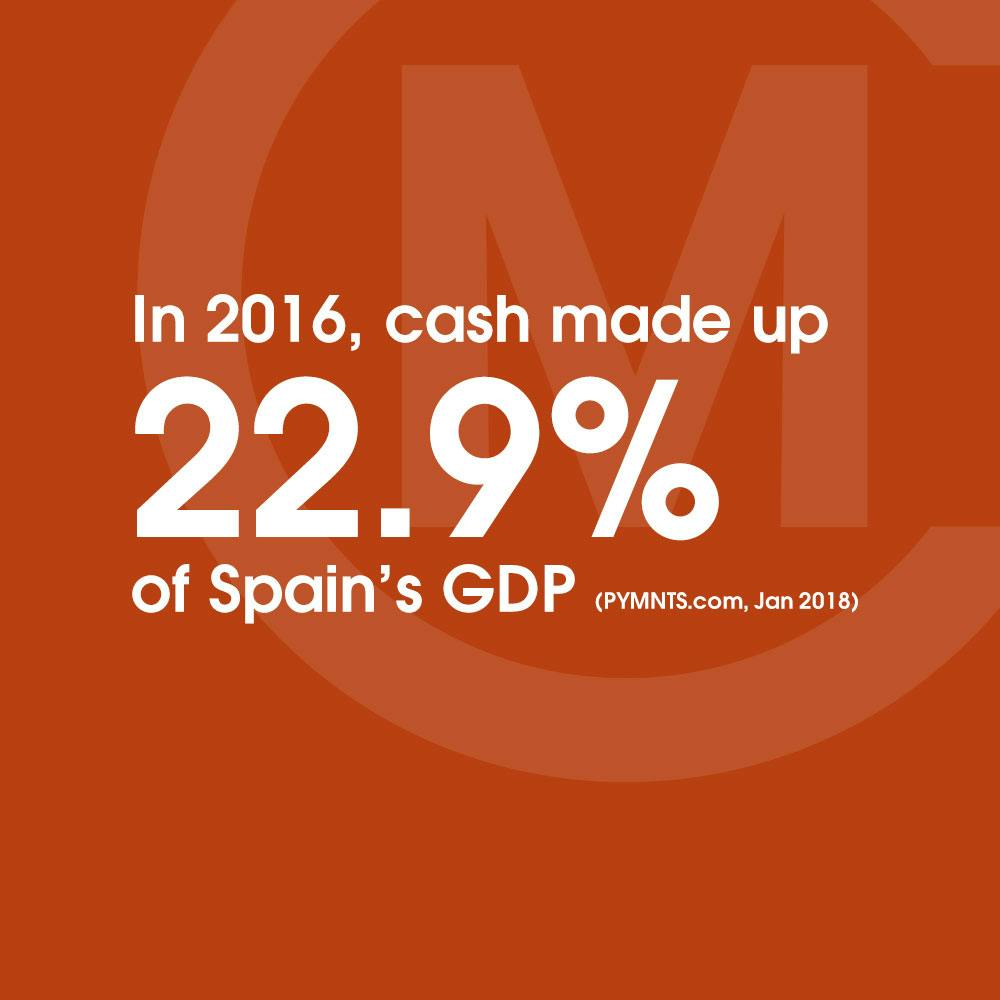
Cash remains red-hot in Spain finds PYMNTS
Despite the impact of the economic crash, the growth in digital options and government proposing cash restrictions, cash is still a preferred payment option in Spain.
According to the latest PYMNTS Global Cash Index™ Spanish Edition (a Cardtronics collaboration), 'when it comes to the cold, hard stuff, Spaniards are less than willing to give up on their payment of choice'.
From 2nd February-31 May 2017, the European Commission open consultation for their prosposed 'EU initiative on restrictions on payments in cash' in order to 'counter terrorism financing'.
The Spanish government have also proposed lowering the limit on the amount of cash per transaction within Spain from the previous limitation of €2,500 to €1,000. The measure, designed to tackle tax fraud, was to be approved by the Council of Ministers on Friday 2 December 2017.
On 21 December 2016, the European Commission proposed to extend the already existing controls on amounts of cash entering or leaving the Union equal to or in excess €10,000.
Key findings include:
- Spain’s cash share in 2016 accounted for 22.9 percent of the country’s GDP.
- Spain boasts an average of 107 ATMs per 100,000 people, one of the highest in Western Europe.
- The country has an average of 67 bank branches per 100,000. Meanwhile, in Western Europe, the average is 38 bank branches per 100,000. The worldwide average is 28 per 100,000. Continue reading...
Excerpt from PYMNTS Global Cash Index™ Spanish Edition (page 2)
There are several factors contributing to Spain’s ongoing love affair with cash and its preference for the payment method over newly available ones. First, the country has a higher rural population than many neighbouring nations, and that group tends to favour cash for its ease of access and security.
Another factor is its thriving underground economy, a byproduct of the global financial crisis of 2009 and the burst of the real estate bubble. Recent estimates peg the value of Spain’s underground economy at roughly 16 percent of the nation’s overall gross domestic product (GDP).
Some recent policy changes could lead to a slight decrease in cash’s influence, however.
The Spanish government is taking measures to reduce parallel economy influence by putting cash in its crosshairs. It recently imposed limits on cash-based transactions for citizens, a move that could undermine the payment method’s influence in Spain’s financial ecosystem.
Despite government intervention and the advent of new technology, cash clearly still thrives in Spain.
Meanwhile, one of the most influential financial institutions (FIs) in Spain recently took steps to make it slightly more difficult to access cash. In March 2015, CaixaBank announced it would begin charging two euros per ATM withdrawal for users without bank-issued payment cards.2 The results of Caixa’s efforts could be visibly measured last year.
Overall, cash in Spain remains strong, thanks, in its part, to larger-than-average ATM accessibility among Spain’s rural population. The PYMNTS Spain Cash Report examines the role of cash in the Spanish marketplace, the factors that have allowed it to thrive and the economic influences shifting the way its citizens use it to pay...
According to PYMNTS’ analysis, Spanish citizens are in no rush to stop using cash. As shown in Figure 4, cash share appears to be declining but at a glacial pace...While still a financial force with which to be reckoned in Spain, other signs indicate cash’s usage is facing new competition from new payment methods... - PYMNTS Global Cash Index™ Spanish Edition (page 7)
Click here to download PYMNTS Global Cash Index™ Spanish Edition
Source
PYMNTS. 'Global Cash Index™ Spanish Edition'. PYMNTS and Cardtronics. Electronically published on January 12, 2018. Accessed January 13, 2018.
About the Index
The PYMNTS.com Global Cash Index™, a Cardtronics collaboration, focuses on the use of cash for making payments and as a payment method that equally plays a role with cards, checks, direct debit and other methods of settling up between consumers and businesses. Unlike most reported estimates of cash, our proprietary data analysis focuses on the use of cash for making payments rather than hoarding.
Related Articles
Cash Matters Keeping Cash: Assessing the Arguments about Cash and Crime
Curtailing cash will do little when criminals already make use of a diverse portfolio of payment technologies and types.[...] Increasingly, electronic forms of transmitting and converting value are just as essential, if not more so, in supporting criminal as well as terrorist activities.
European Commission Publications Travelling in Europe 2017-2018
EU rules have made electronic payments in the euro as easy as cash payments. Banks must charge the same fees for international payments in euros within the EU as for a national transaction of the same value in euros. So withdrawing euros from a cash machine anywhere in the EU costs you the same as it does in your own country from a cash machine that does not belong to your bank... If you enter or leave the EU with 10,000 or more in cash (or its equivalent in other currencies) you must declare it to the customs authorities.
Euro Weekly News Spanish government to limit cash spending to €1000
The Spanish government have announced a series of proposals designed to tackle tax fraud. The first is to lower the limit on the amount of cash that can be spent in one transaction from an existing €2,500 to €1,000... These measures were due to be approved in the Council of Ministers on Friday 2 December 2017.
The Merkle Spanish government wants to curb cash usage to 1,000 euros per transactions
It is quite apparent that the financial situation in Spain is evolving in the wrong direction. As of right now, there is a”ceiling” of 2,500 Euros per cash transaction. A similar ruling can be found across many different European countries, as governments want to counter money laundering efforts. In Spain, however, the limit of cash payments will be reduced to 1,000 Euros moving forward.
Cash Essentials Spaniards are fond of new cashback service
A year ago, ING bank in Spain launched a cashback service via its mobile app Twyp, and it has proven to be a huge success. The app, accessible to both clients and non-clients of the bank, allows consumers to get money back from a number of stores such as Dia, Galp, Disa, Shell and tobacco shops when they carry out a purchase – and these services are available at 4,000 locations nationwide.

